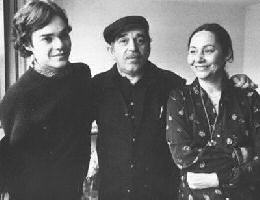 warning: contains spoiler
warning: contains spoilerAlas, I have finished, and I didn't want it to end.
I closed the covers of Cien Años and said goodbye to all the characters that I have grown to love. *sigh. I know that I have truly enjoyed a book when I am sad to finish it. Though as well, the ending is sad and tragic, especially the part where the ants carry off the dead newborn baby. Yikes. And those Beundía's, they sure can't stop falling into bed with each other. I wonder if it was a bit of a moral statement that the unbridled passion between Aureliano Babalonia and his aunt, Amaranta Ursula ended in the death of their pig-tailed newborn, not to mention the end of the whole town itself? The significance of Aureliano's last name I think plays into it a bit (as we discussed in class). It is interesting that the town went from it's origins of just a quiet place where the founders lived with hardly any access to the outside world, to a place of wars, commerce, whorehouses and a massacre (though, after writing whorehouses, I questioned whether it really belonged in the list as Marquez doesn't seem to have a real problem with whorehouses and puts them in almost every book; though, I'll leave it in anyways), mimicking Babylon somewhat (thanks to Mikael for filling me in on a more complete version of the story of Babylon). Though are the two punished for incest? They weren't aware that they were related. Maybe were they punished for being so madly in love? It seems to be more the trend in the novel. Those who fall madly in love are somehow punished. Starting with Aureliano and Remedios (who dies), Arcadio is killed after falling in love with Sofia de la Piedad, Meme is sent to a nunnery for falling for Mauricio, Pietro Crespi is punished twice over for his love of Rebeca and then Amaranta. I could go on, but you read the book. Just a thought, but I feel that the Buendía's were never destined for happiness and love, but for loneliness and solitude.





